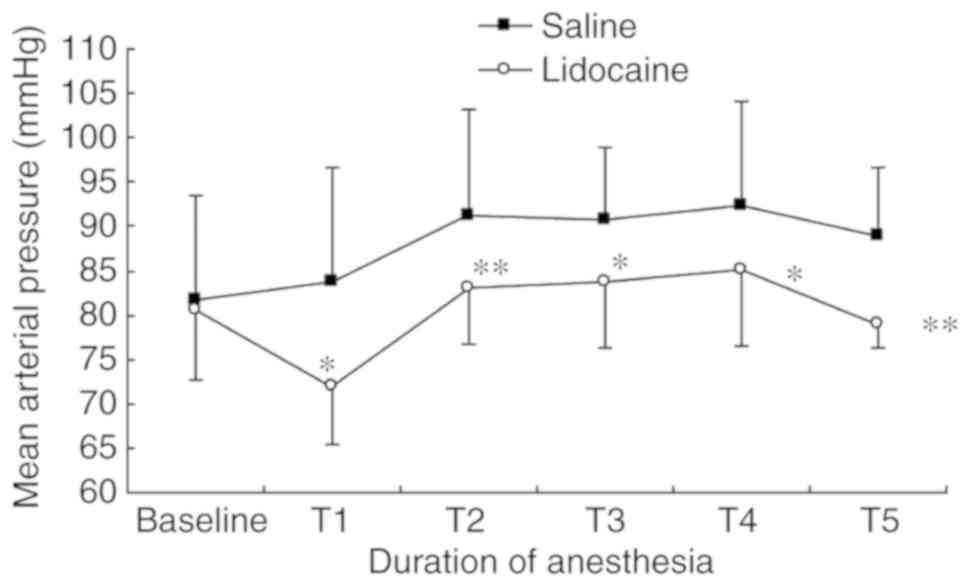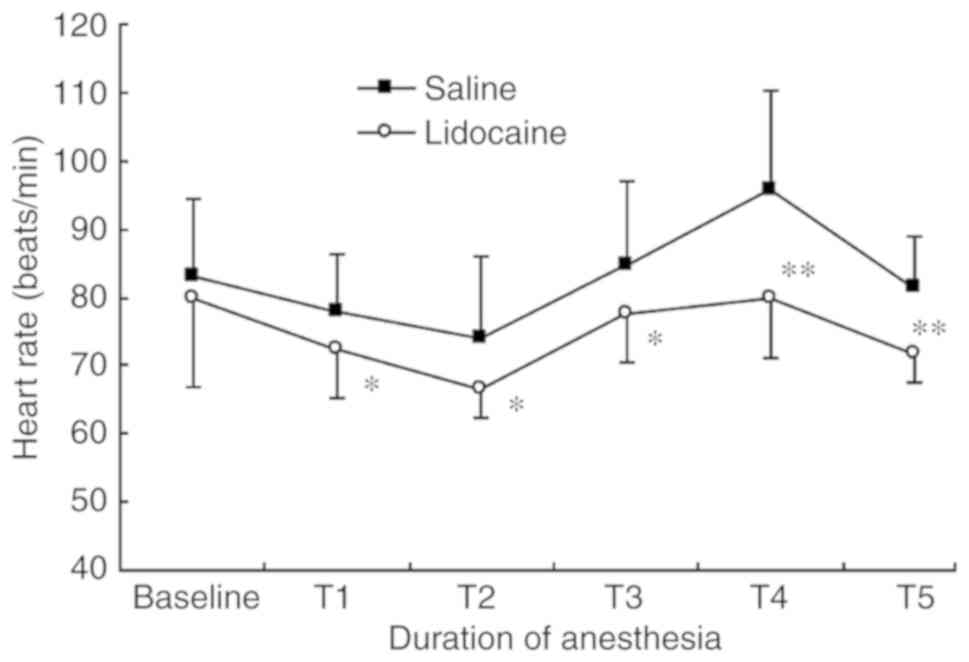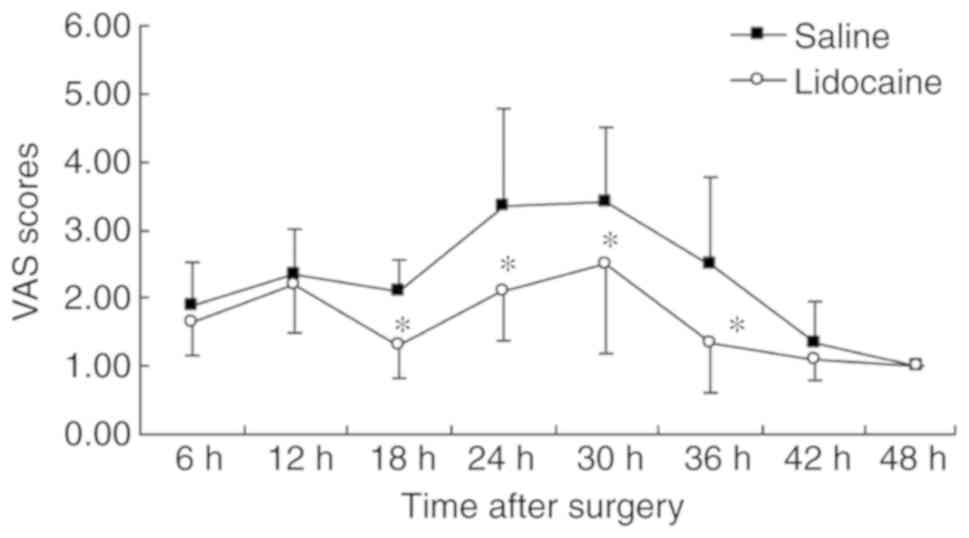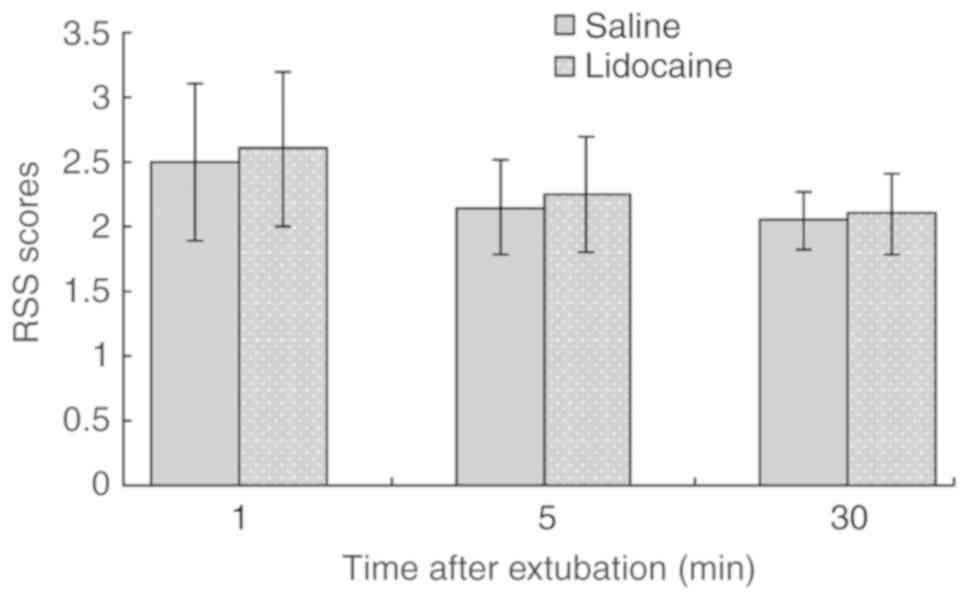|
1
|
Buia A, Stockhausen F and Hanisch E:
Laparoscopic surgery: A qualified systematic review. World J
Methodol. 5:238–254. 2015. View Article : Google Scholar : PubMed/NCBI
|
|
2
|
Gan TJ: Risk factors for postoperative
nausea and vomiting. Anesth Analg. 102:1884–1898. 2006. View Article : Google Scholar : PubMed/NCBI
|
|
3
|
Franck M, Radtke FM, Apfel CC, Kuhly R,
Baumeyer A, Brandt C, Wernecke KD and Spies CD: Documentation of
post-operative nausea and vomiting in routine clinical practice. J
Int Med Res. 38:1034–1041. 2010. View Article : Google Scholar : PubMed/NCBI
|
|
4
|
Choi DH, Ko JS, Ahn HJ and Kim JA: A
Korean predictive model for postoperative nausea and vomiting. J
Korean Med Sci. 20:811–815. 2005. View Article : Google Scholar : PubMed/NCBI
|
|
5
|
Apfel CC, Heidrich FM, Jukar-Rao S, Jalota
L, Hornuss C, Whelan RP, Zhang K and Cakmakkaya OS: Evidence-based
analysis of risk factors for postoperative nausea and vomiting. Br
J Anaesth. 109:742–753. 2012. View Article : Google Scholar : PubMed/NCBI
|
|
6
|
Wu O, Belo SE and Koutsoukos G: Additive
antiemetic efficacy of prophylactic ondansetron with droperidol in
out-patient gynecological laparoscopy. Can J Anaesth. 47:529–536.
2000. View Article : Google Scholar : PubMed/NCBI
|
|
7
|
Achuthan S, Singh I, Varthya SB,
Srinivasan A, Chakrabarti A and Hota D: Gabapentin prophylaxis for
postoperative nausea and vomiting in abdominal surgeries: A
quantitative analysis of evidence from randomized controlled
clinical trials. Br J Anaesth. 114:588–597. 2015. View Article : Google Scholar : PubMed/NCBI
|
|
8
|
Apfel CC: Postoperative nausea and
vomiting. Miller's anesthesia. 7th. Miller RD: Churchill
Livingstone; Philadelphia, PA: pp. 2729–2755. 2010, View Article : Google Scholar
|
|
9
|
Swaika S, Pal A, Chatterjee S, Saha D and
Dawar N: Ondansetron, ramosetron, or palonosetron: Which is a
better choice of antiemetic to prevent postoperative nausea and
vomiting in patients undergoing laparoscopic cholecystectomy?
Anesth Essays Res. 5:182–186. 2011. View Article : Google Scholar : PubMed/NCBI
|
|
10
|
Shaikh SI, Nagarekha D, Hegade G and
Marutheesh M: Postoperative nausea and vomiting: A simple yet
complex problem. Anesth Essays Res. 10:388–396. 2016. View Article : Google Scholar : PubMed/NCBI
|
|
11
|
Herminghaus A, Wachowiak M, Wilhelm W and
Gottschalk A, Eggert K and Gottschalk A: Intravenous administration
of lidocaine for perioperative analgesia. Review and
recommendations for practical usage. Anaesthesist. 60:152–160.
2011.(In German). View Article : Google Scholar : PubMed/NCBI
|
|
12
|
Jendoubi A, Naceur IB, Bouzouita A, Trifa
M, Ghedira S, Chebil M and Houissa M: A comparison between
intravenous lidocaine and ketamine on acute and chronic pain after
open nephrectomy: A prospective, double-blind, randomized,
placebo-controlled study. Saudi J Anaesth. 11:177–184. 2017.
View Article : Google Scholar : PubMed/NCBI
|
|
13
|
Weibel S, Jokinen J, Pace NL, Schnabel A,
Hollmann MW, Hahnenkamp K, Eberhart LH, Poepping DM, Afshari A and
Kranke P: Efficacy and safety of intravenous lidocaine for
postoperative analgesia and recovery after surgery: A systematic
review with trial sequential analysis. Br J Anaesth. 116:770–783.
2016. View Article : Google Scholar : PubMed/NCBI
|
|
14
|
Tikuišis R, Miliauskas P, Samalavičius NE,
Žurauskas A, Samalavičius R and Zabulis V: Intravenous lidocaine
for post-operative pain relief after hand-assisted laparoscopic
colon surgery: A randomized, placebo-controlled clinical trial.
Tech Coloproctol. 18:373–380. 2014. View Article : Google Scholar : PubMed/NCBI
|
|
15
|
McKay A, Gottschalk A, Ploppa A, Durieux
ME and Groves DS: Systemic lidocaine decreased the perioperative
opioid analgesic requirements but failed to reduce discharge time
after ambulatory surgery. Anesth Analg. 109:1805–1808. 2009.
View Article : Google Scholar : PubMed/NCBI
|
|
16
|
Kaba A, Laurent SR, Detroz BJ, Sessler DI,
Durieux ME, Lamy ML and Joris JL: Intravenous lidocaine infusion
facilitates acute rehabilitation laparoscopic colectomy.
Anesthesiology. 106:11–18. 2007. View Article : Google Scholar : PubMed/NCBI
|
|
17
|
Lauwick S, Kim DJ, Mistraletti G and Carli
F: Functional walking capacity as an outcome measure of
laparoscopic prostatectomy: The effect of lidocaine infusion. Br J
Anaesth. 103:213–219. 2009. View Article : Google Scholar : PubMed/NCBI
|
|
18
|
Lauwick S, Kim DJ, Michelagnoli G,
Mistraletti G, Feldman L, Fried G and Carli F: Intraoperative
infusion of lidocaine reduces postoperative fentanyl requirements
in patients undergoing laparoscopic cholecystectomy. Can J Anaesth.
55:754–760. 2008. View Article : Google Scholar : PubMed/NCBI
|
|
19
|
Grady MV, Mascha E, Sessler DI and Kurz A:
The effect of perioperative intravenous lidocaine and ketamine on
recovery after abdominal hysterectomy. Anesth Analg. 115:1078–1084.
2012. View Article : Google Scholar : PubMed/NCBI
|
|
20
|
Myles PS, Weitkamp B, Jones K, Melick J
and Hensen S: Validity and reliability of a postoperative quality
of recovery score: The QoR-40. Br J Anaesth. 84:11–15. 2000.
View Article : Google Scholar : PubMed/NCBI
|
|
21
|
Gornall BF, Myles PS, Smith CL, Burke JA,
Leslie K, Pereira MJ, Bost JE, Kluivers KB, Nilsson UG, Tanaka Y
and Forbes A: Measurement of quality of recovery using the QoR-40:
A quantitative systematic review. Br J Anaesth. 111:161–169. 2013.
View Article : Google Scholar : PubMed/NCBI
|
|
22
|
Aronson WL, McAuliffe MS and Miller K:
Variability in the American society of anesthesiologists physical
status classification scale. AANA J. 71:265–274. 2003.PubMed/NCBI
|
|
23
|
Ramsay MA, Savege TM, Simpson BR and
Goodwin R: Controlled sedation with alphaxalone-alphadolone. Br Med
J. 2:656–659. 1974. View Article : Google Scholar : PubMed/NCBI
|
|
24
|
Carlsson AM: Assessment of chronic pain.
I. Aspects of the reliability and validity of the visual analogue
scale. Pain. 16:87–101. 1983. View Article : Google Scholar : PubMed/NCBI
|
|
25
|
Eberhart LH, Seeling W, Ulrich B, Morin AM
and Georgieff M: Dimenhydrinate and metoclopramide alone or in
combination for prophylaxis of PONV. Can J Anaesth. 47:780–185.
2000. View Article : Google Scholar : PubMed/NCBI
|
|
26
|
Phillips C, Brookes CD, Rich J, Arbon J
and Turvey TA: Postoperative nausea and vomiting following
orthognathic surgery. Int J Oral Maxillofac Surg. 44:745–751. 2015.
View Article : Google Scholar : PubMed/NCBI
|
|
27
|
Sinclair DR, Chung F and Mezei G: Can
postoperative nausea and vomiting be predicted? Anesthesiology.
91:109–118. 1999. View Article : Google Scholar : PubMed/NCBI
|
|
28
|
Cardoso FC and Lewis RJ: Sodium channels
and pain: From toxins to therapies. Br J Pharmacol. 175:2138–2157.
2018. View Article : Google Scholar : PubMed/NCBI
|
|
29
|
Lauretti GR: Mechanisms of analgesia of
intravenous lidocaine. Rev Bras Anestesiol. 58:280–286. 2008.(In
English). View Article : Google Scholar : PubMed/NCBI
|
|
30
|
Nakhli MS, Kahloul M, Guizani T, Zedini C,
Chaouch A and Naija W: Intravenous lidocaine as adjuvant to general
anesthesia in renal surgery. Libyan J Med. 13:14334182018.
View Article : Google Scholar : PubMed/NCBI
|
|
31
|
Kalso E: Sodium channel blockers in
neuropathic pain. Curr Pharm Des. 11:3005–3011. 2005. View Article : Google Scholar : PubMed/NCBI
|
|
32
|
Kawamata M, Sugino S, Narimatsu E,
Yamauchi M, Kiya T, Furuse S and Namiki A: Effects of systemic
administration of lidocaine and QX-314 on hyperexcitability of
spinal dorsal horn neurons after incision in the rat. Pain.
122:68–80. 2006. View Article : Google Scholar : PubMed/NCBI
|
|
33
|
Hahnenkamp K, Durieux ME, Hahnenkamp A,
Schauerte SK, Hoenemann CW, Vegh V, Theilmeier G and Hollmann MW:
Local anaesthetics inhibit signalling of human NMDA receptors
recombinantly expressed in Xenopus laevis oocytes: Role of protein
kinase C. Br J Anaesth. 96:77–87. 2006. View Article : Google Scholar : PubMed/NCBI
|
|
34
|
Sugimoto M, Uchida I and Mashimo T: Local
anaesthetics have different mechanisms and sites of action at the
recombinant N-methyl-D aspartate (NMDA) receptors. Br J Pharmacol.
138:876–882. 2003. View Article : Google Scholar : PubMed/NCBI
|
|
35
|
Yousefshahi F, Predescu O and Asenjo JF:
The efficacy of systemic lidocaine in the management of chronic
pain: A literature review. Anesth Pain Med. 7:e447322017.
View Article : Google Scholar : PubMed/NCBI
|
|
36
|
Yardeni IZ, Beilin B, Mayburd E, Levinson
Y and Bessler H: The effect of perioperative intravenous lidocaine
on postoperative pain and immune function. Anesth Analg.
109:1464–1469. 2009. View Article : Google Scholar : PubMed/NCBI
|
|
37
|
Hans GA, Lauwick SM, Kaba A, Bonhomme V,
Struys MM, Hans PC, Lamy ML and Joris JL: Intravenous lidocaine
infusion reduces bispectral index-guided requirements of propofol
only during surgical stimulation. Br J Anaesth. 105:471–479. 2010.
View Article : Google Scholar : PubMed/NCBI
|
|
38
|
Ahn E, Kang H, Choi GJ, Park YH, Yang SY,
Kim BG and Choi SW: Intravenous lidocaine for effective pain relief
after a laparoscopic colectomy: A prospective, randomized,
double-blind, placebo-controlled study. Int Surg. 100:394–401.
2015. View Article : Google Scholar : PubMed/NCBI
|
|
39
|
Koppert W, Weigand M, Neumann F, Sittl R,
Schuettler J, Schmelz M and Hering W: Perioperative intravenous
lidocaine has preventive effects on postoperative pain and morphine
consumption after major abdominal surgery. Anesth Analg.
98:1050–1055. 2004. View Article : Google Scholar : PubMed/NCBI
|
|
40
|
Zhang J, Zhang H, Zhao L, Gu J, Feng Y and
An H: Population pharmacokinetic modeling of flurbiprofen, the
active metabolite of flurbiprofen axetil, in Chinese patients with
postoperative pain. J Pain Res. 11:3061–3070. 2018. View Article : Google Scholar : PubMed/NCBI
|
|
41
|
Fujii Y and Itakura M: Comparison of
lidocaine, metoclopramide, and flurbiprofen axetil for reducing
pain on injection of propofol in Japanese adult surgical patients:
A prospective, randomized, double-blind, parallel-group,
placebo-controlled study. Clin Ther. 30:280–286. 2008. View Article : Google Scholar : PubMed/NCBI
|
|
42
|
Kuo CP, Jao SW, Chen KM, Wong CS, Yeh CC,
Sheen MJ and Wu CT: Comparison of the effects of thoracic epidural
analgesia and i.v. infusion with lidocaine on cytokine response,
postoperative pain and bowel function in patients undergoing
colonic surgery. Br J Anaesth. 97:640–646. 2006. View Article : Google Scholar : PubMed/NCBI
|
|
43
|
Myles PS, Hunt JO, Fletcher H, Solly R,
Woodward D and Kelly S: Relation between quality of recovery in
hospital and quality of life at 3 months after cardiac surgery.
Anesthesiology. 95:862–867. 2001. View Article : Google Scholar : PubMed/NCBI
|
|
44
|
Murphy GS, Szokol JW, Greenberg SB, Avram
MJ, Vender JS, Nisman M and Vaughn J: Preoperative dexamethasone
enhances quality of recovery after laparoscopic cholecystectomy:
Effect on in-hospital and postdischarge recovery outcomes.
Anesthesiology. 114:882–890. 2011. View Article : Google Scholar : PubMed/NCBI
|
|
45
|
Poitras S, Beaule PE and Dervin GF:
Validity of a short-term quality of life questionnaire in patients
undergoing joint replacement: The quality of recovery-40. J
Arthroplasty. 27:1604–1608. 2012. View Article : Google Scholar : PubMed/NCBI
|


















